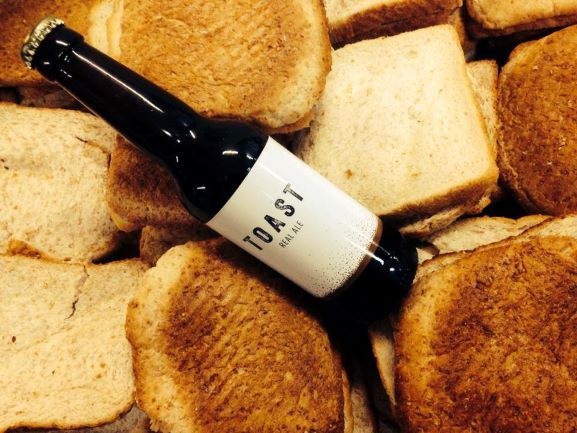

Bread or toast is a quintessential breakfast and on-the-go food, and is found in every home. But owing to its very short shelf life, there’s often so much left over or wasted, when it does not reach food banks or many feeding programs find themselves unable to cope with the excess.
| Did You Know? 44% of Bread is wasted around the world |
But a British award-winning author and campaigner on environmental and social impact of food production, Tristram Stuart, has found a unique way to reduce wastage – introducing Toast Ale.
Stuart takes surplus bread and uses it to produce our favourite bar tipple: beer. The idea took shape when he visited a brewery in Belgium, the Brussels Beer Project, where beer was being made from waste bread. Previously, during a visit to a sandwich factory in 2016, he saw 13,000 slices of bread getting discarded every day. This was his eureka moment that triggered the drink.
“That is a killer of an idea, because I know bread was being wasted all over the world in industrial quantities while it is still absolutely fresh. I know that there is a distributed global network of craft brewers with whom there is culture of collaboration, talent, real openness, and interest in cracking problems. And, of course, he adds, there was already “a global network of food-waste fighters who were looking for entrepreneurial ways to turn food waste into revenue for non-profits.”
Today, Stuart’s “Team Toast” have built Toast Ale—an award-winning beer made from surplus bread. Since its creation, Toast Ale has won a silver (2017) and a bronze (2018) award from the International Beer Challenge. Team member 25-year-old Michael Lawrence is taking over pubs in London to raise awareness about the dangers of food waste, and promote simple, innovative and local solutions that can help curb it.
[related_post]
Lawrence’s concerns focuses on the link between food waste and air pollution. Food in landfills releases methane, which—in the first two decades after its release—is 84 times more potent as a greenhouse gas than carbon dioxide. For every kilogram of food ending up in landfills, almost four kilograms of greenhouse gases are emitted, notes Lawrence.
He adds that everyday food, which will only go waste, is transported around, causing as much emissions as about 39 million passenger vehicles.
“Toast Ale’s bigger mission is to rescue 1 billion slices of surplus bread. This reflects our ambition as a business—to start a global movement and genuinely change society’s attitude to wasting food. We want to reframe what constitutes “waste” in the eyes of the public. Our next step is to launch our beer in 330 milliliter cans through a crowdfunding campaign. They keep the beer tasting great and offer environmental benefits as they are lighter and easier to transport and stack, drastically reducing freight emissions. One report from the Aluminium Association suggests cans may result in 35 percent lower emissions per ounce”, said Lawrence.
Movements like the Extinction Rebellion, and David Attenborough’s recent Climate Change program, Climate Change – The Facts, are aiding this change and leading to new ideas and innovation.
With world leaders often faltering midway through any climate change policy move, people like Tristram Stuart are showing the world that even one idea can have a domino effect and inspire many other food crusaders to act and solve issues like food wastage differently.
1. The mandate for blending Compressed Biogas (CBG) with natural gas has come into effect…
Andhra Pradesh is striving towards greening its energy sector with quite some speed. In a…
With an objective to bolster India’s green energy goals, a Tripartite Agreement has been signed…
The Union MNRE Minister Pralhad Joshi launched the Green Hydrogen Certification Scheme of India (GHCI)…
India’s energy conglomerate Bharat Petroleum Corporation Limited (BPCL) has commissioned a 5MW green hydrogen plant…
In a historical development, the European Space Agency (ESA) has successfully launched its pioneering ‘Biomass’…